2007年3月到2013年09月PETS 2级听力原文及答案
- 格式:doc
- 大小:2.23 MB
- 文档页数:23
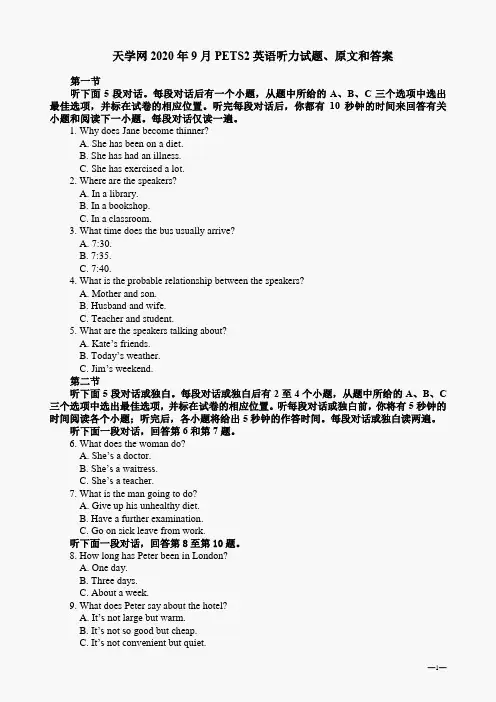
天学网2020年9月PETS2英语听力试题、原文和答案第一节听下面5段对话。
每段对话后有一个小题,从题中所给的A、B、C三个选项中选出最佳选项,并标在试卷的相应位置。
听完每段对话后,你都有10秒钟的时间来回答有关小题和阅读下一小题。
每段对话仅读一遍。
1. Why does Jane become thinner?A. She has been on a diet.B. She has had an illness.C. She has exercised a lot.2. Where are the speakers?A. In a library.B. In a bookshop.C. In a classroom.3. What time does the bus usually arrive?A. 7:30.B. 7:35.C. 7:40.4. What is the probable relationship between the speakers?A. Mother and son.B. Husband and wife.C. Teacher and student.5. What are the speakers talking about?A. Kate’s friends.B. Today’s weather.C. Jim’s weekend.第二节听下面5段对话或独白。
每段对话或独白后有2至4个小题,从题中所给的A、B、C 三个选项中选出最佳选项,并标在试卷的相应位置。
听每段对话或独白前,你将有5秒钟的时间阅读各个小题;听完后,各小题将给出5秒钟的作答时间。
每段对话或独白读两遍。
听下面一段对话,回答第6和第7题。
6. What does the woman do?A. She’s a doctor.B. She’s a waitress.C. She’s a teacher.7. What is the man going to do?A. Give up his unhealthy diet.B. Have a further examination.C. Go on sick leave from work.听下面一段对话,回答第8至第10题。

2016年3月全国英语等级考试二级听力真题(含录音原文及答案)-CAL-FENGHAI-(2020YEAR-YICAI)_JINGBIAN2016年3月全国英语等级考试二级听力第一节听下面5段对话,每段对话后有一个小题,从题中所给的A 、B、C三个选项中选出最佳选项,并标在试卷的相应位置。
听完每段对话后,你都有10秒钟的时间来回答有关小题和阅读下一小题。
每段对话仅读一遍。
1. Where does the conversation probably take place?A. In an office.B. In a theatre.C. In a restaurant.2. How old is the man now?A. About 20.B. Nearly 40.C. Over 60.3. What is the man going to do?A. Go to the information counter.B. Take a train to leave New York.C. Check the price of the ticket.4. What do we learn about the man?A. He quitted his job.B. He has got two job offers.C. He is doing a part-time job.5. What does Mr. Anderson do?A. He is a teacher.B. He is a librarian.C. He is a repairman.第二节听下面5段对话或独白。
每段对话或独白后有2至4个小题,从题中所给的A. 、B. 、C. 三个选项中选出最佳选项,并标在试卷的相应位置。
听每段对话或独白前,你将有5秒钟的时间阅读各个小题;听完后,各小题将给出5秒钟的作答时间。
每段对话或独白读两遍。
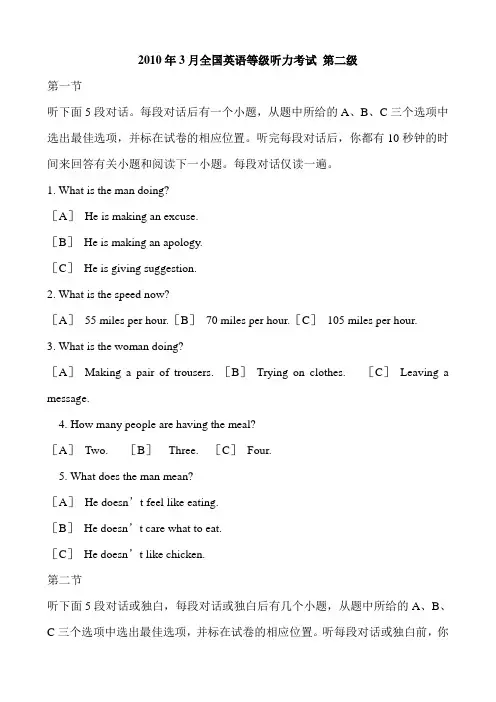
2010年3月全国英语等级听力考试第二级第一节听下面5段对话。
每段对话后有一个小题,从题中所给的A、B、C三个选项中选出最佳选项,并标在试卷的相应位置。
听完每段对话后,你都有10秒钟的时间来回答有关小题和阅读下一小题。
每段对话仅读一遍。
1. What is the man doing?[A]He is making an excuse.[B]He is making an apology.[C]He is giving suggestion.2. What is the speed now?[A]55 miles per hour.[B]70 miles per hour.[C]105 miles per hour.3. What is the woman doing?[A]Making a pair of trousers. [B]Trying on clothes. [C]Leaving a message.4. How many people are having the meal?[A]Two. [B]Three. [C]Four.5. What does the man mean?[A]He doesn’t feel like eating.[B]He doesn’t care what to eat.[C]He doesn’t like chicken.第二节听下面5段对话或独白,每段对话或独白后有几个小题,从题中所给的A、B、C三个选项中选出最佳选项,并标在试卷的相应位置。
听每段对话或独白前,你将有时间阅读各个小题,每小题5秒钟;听完后,各小题将给出5秒钟的作答时间。
每段对话或独白读两遍。
听下面一段对话,回答第6和第7两个小题。
6. Who is the woman?[A]A hotel staff. [B]A bank clerk. [C] A restaurant manager.7. Why is the man at the hotel?[A]To hold a business meeting.[B]To eat at the restaurant.[C]To spend his holidays.听下面一段对话,回答第8至第10三个小题。

第2章听力技巧指南及专项训练2.1 题型概述该部分由A、B两节组成,考查考生理解英语口语的能力。
要求考生根据所听到的5段简短对话,从每题所给的3个选择项中选出最佳选项。
B节要求考生根据所听到的5段对话或独白,从每题所给的3个选择项中选出最佳选项。
每段录音材料只播放一遍。
问题不在录音中播放,仅在试卷上印出。
PETS第2级考生应能听懂熟悉的日常生活中发音清楚、语速较慢的简短独自和对话等。
考生应能做到以下几点:·理解主旨要义;·获取事实性的具体信息;·对说话的背景、说话者之间的关系等能作出简单的推断;·理解说话者的意图、观点或态度。
2.2 应试技巧I. 短对话听力部分A节考试中包含10道短对话题目,对应十篇短对话文章。
考试要点为两人说话内容推理或解析。
短对话大致可以归纳为以下几类:◆地点场景题,人物关系题与人物职业题所用方法一致,听对应的标志词即可。
例:1. Where is National City Bank? [2013年3月真题][A] On Elm Street.[B] On Oak Street.[C] On Poplar Street.【答案】B【解析】录音中男士问:“我怎样才可以去花旗银行?”,女士回答说:“Walk down Elm Street as far as the traffic lights; turn left onto Poplar Street; walk to the end onto Oak Street and the bank is on your left.”,由此可知,先沿着Elm Street向下走,在红绿灯口左转到Poplar Street,一直走到底,然后到Oak Street,银行就在你的左边,即银行在Oak Street上。
【录音原文】M: How can I get to National City Bank?W: Walk down Elm Street as far as the traffic lights; turn left onto Poplar Street; walk to the end onto Oak Street and the bank is on your left.◆转折词引导题一般情况下,转折处是考点,但是需要将整个句子听完整,并看清题目要求,以免选择错误。
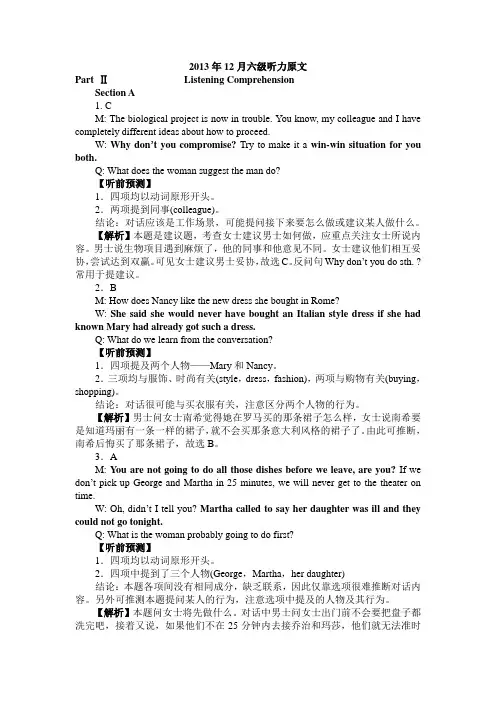
2013年12月六级听力原文Part ⅡListening ComprehensionSection A1. CM: The biological project is now in trouble. You know, my colleague and I have completely different ideas about how to proceed.W: Why don’t you compromise? Try to make it a win-win situation for you both.Q: What does the woman suggest the man do?【听前预测】1.四项均以动词原形开头。
2.两项提到同事(colleague)。
结论:对话应该是工作场景,可能提问接下来要怎么做或建议某人做什么。
【解析】本题是建议题,考查女士建议男士如何做,应重点关注女士所说内容。
男士说生物项目遇到麻烦了,他的同事和他意见不同。
女士建议他们相互妥协,尝试达到双赢。
可见女士建议男士妥协,故选C。
反问句Why don’t you do sth. ?常用于提建议。
2.BM: How does Nancy like the new dress she bought in Rome?W: She said she would never have bought an Italian style dress if she had known Mary had already got such a dress.Q: What do we learn from the conversation?【听前预测】1.四项提及两个人物——Mary和Nancy。
2.三项均与服饰、时尚有关(style,dress,fashion),两项与购物有关(buying,shopping)。
结论:对话很可能与买衣服有关,注意区分两个人物的行为。

2007年下半年自考英语(二)真题试卷(题后含答案及解析)题型有:1. V ocabulary and Structrue 2. Cloze Test 3. Reading Comperhension 4. Word Spelling 5. Word From 6. Translation from Chinese into English 7. Translation from English into ChineseV ocabulary and Structrue1.It makes good______to bring all umbrella;it seems to be raining today.A.senseB.reasonC.suggestionD.advice正确答案:A解析:今天看来要下雨了,带伞还是很明智的/很有意义的。
sense:明智,常识,判断力;make sense:有意义。
2.If you are too______of your children,they will never learn to deal with difficulties in life.A.respectiveB.detectiveC.protectiveD.effective正确答案:C解析:如果你对孩子保护太多,他们就无法学会应对人生的艰难。
protective:给予保护的,保护的;respective:分别的,各种的。
detective:侦探;effective:有效的,给人深刻印象的。
3.His intelligence will______him to get a scholarship to college.A.enableB.persuadeC.suggestD.employ正确答案:A解析:他的才智使他能获得一笔上大学的奖学金。
enable to do:使……有做……的能力。
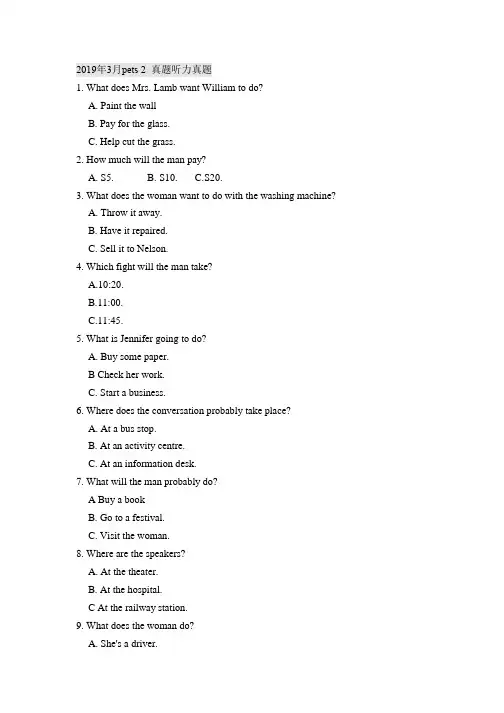
2019年3月pets 2 真题听力真题1. What does Mrs. Lamb want William to do?A. Paint the wallB. Pay for the glass.C. Help cut the grass.2. How much will the man pay?A. S5.B. S10.C.S20.3. What does the woman want to do with the washing machine?A. Throw it away.B. Have it repaired.C. Sell it to Nelson.4. Which fight will the man take?A.10:20.B.11:00.C.11:45.5. What is Jennifer going to do?A. Buy some paper.B Check her work.C. Start a business.6. Where does the conversation probably take place?A. At a bus stop.B. At an activity centre.C. At an information desk.7. What will the man probably do?A Buy a bookB. Go to a festival.C. Visit the woman.8. Where are the speakers?A. At the theater.B. At the hospital.C At the railway station.9. What does the woman do?A. She's a driver.B. She's a singer.C. She's a doctor.10. What did the man do to help the woman?A. Book the hotel.B. Look after Alan.C. Play in the concert.11. What is the woman doing?A. Asking for advice.B. Chairing a meeting.C. Hosting a program.12. When was Bergen founded?A. In1070.B. In the 1200s.C. In the 1830s.13. What does Mr. Wilson suggest people doing Bergen?A. Read a fairy tale.B. Walk around the city.C. Buy a wooden house.14. What is the probable relationship between the speaker?A. Strangers.B. RoommatesC. Neighbors.15. Where did Paul get the information about the flat?A. From a good friend.B From Mrs Hamilton.C. From the newspaper.16. How many bedrooms are there in the flat?A. Three.B. Two.C. One.17. What does the woman ask Paul to do?A. Pay the rent first.B. Come to see the flat.C. Call her this afternoon.18. Who has become the Union Party leader?A. Robert Tennen.B. Harry Johnson.C. Jim Hardy.19. What will happen to 10th Street tomorrow?A. It will be closed.B. It will be cleaned.C. It will be rebuilt.20. What will the weather be like tomorrow?A. Sunny.B. Snowy.C. Rainy.2019年3月pets 2 真题听力原文1 M: I'm very sorry, Mrs Lamb. It's all my fault. I allowed William to play with the ball against the wall. I'll pay for the glass. W: Well, I would rather he help me cut the grass.2 M: Excuse me, How much are the tickets, please? W: They are $10 each, but students go half price. M: Two student tickets, please. Here are our student IDs.3 W: Jim, do you know anyone who can help me with this terrible washing machine?M: Usually, I will call the Nelsons' company, but if you want to spend less, you may call the Andersons instead. 4 M: Hello, is there a flight leaving for London at 11: 00? W: Nothing round that time, but there are nights leaving at 10: 20 and 11: 45. M: All right, I'll take the earlier one. 5 M: Jennifer, our business is growing fast. Please make sure that we have enough paper to keep up with our work. W: I remember we bought some last month. Shall I order some more now? M: Yes, please do! 6. M: Hello, Could you please help us? We'd like a map of this city. W: Yes, here you are. M: Oh, could you also give us some information about the film festival? W: Take this booklet. It has all the information about the activities that will be put on during the festival. M: Thanks. And one last thing. do you have a bus timetable for East Town? W: Yes. here you are. M: Thank you very much. 7 W: Well, I’d better be going. My train is about to leave anytime now. M: Right. W: It was nice meeting you. Thanks for coming to see me off. M: That's all right. It was nice meeting you, too. I really enjoyed the concert. I think it went really well. All the songs you sang last night were great. W: Thank you, and thanks for being so helpful booking the hotel and everything. M: It was my pleasure, I should thank Alan. If he hadn’t been ill, I wouldn't have had this chance to help organize the concert and to meet you. W: Oh, yeah. Give my regards to Alan. I hope he'll be better soon. Well, I’ll be off, then. Il see you around. M: Ok, wee you. 8 W: Mr Wilson, it’s nice to have you with us this evening. M: Well, I’m glad to be on the program to introduce my hometown. W: OK, let's begin, Does Bergen have a long history? M: Yes, it does. Bergen was founded by King Olav Kyrre in 1070, and it became Norway's first real capital in the 13th century. Until the 1830s Bergen was the biggest town in Norway, because it was a major European trading seaport then. W: What are the major industries in Bergen? M: Well, fishing and oil k gas industries are important parts in Bergen's economy. Trade and traveling by sea also play an important role. Many tourists visit the city every year.W: Why are tourists so interested in Bergen? M: Bergen is famous for its unusual beauty of the sea and mountains and old wooden buildings. You have to experience it for yourself. The city is worth touring around on foot. Slowly walking around old streets where people have lived for centuries is like a fairy tale. You will see small wooden houses, streets with stone steps, and flowers everywhere. 9 W: Hello. This is the Hamiltons’. M: Oh, hello. My name's Paul Blake. I'm ringing about the flat. W: Oh, yes, you saw it in the newspaper, didn't you? M: That's right. Could you tell me something about the fat? W: Well, there's quite a big sitting room and a kitchen. M: Good. What about bedrooms? W: There are two bedrooms; one big and one small but quite nice. M: I see. W: It's an upstairs flat, on the top floor of the house. We live downstairs. M: Um... How much is it exactly? W: Well, 200 pounds a week.M: 200 pounds. W: Look, why don't you come round and see the flat? Then you can make up your mind. It's better than trying to talk about it over the phone. M: Yes. May I see it now? W: Well, it's a bit difficult for me this morning. I've got to go out. M: How about this afternoon? At about three? W: OK, three would be fine for me. M: Right. See you this afternoon, then bye. 10 Hello, this is Harry Johnson with the news update of this hour. In the race for the 11th Union Party leader, after the final count, Robert Tennen has beaten Jim Hardy by 10%.In other news, 10thStreet will be closed for two days starting at noon tomorrow, as thewater company needs to repair a water pipe there. Drivers are advised to take 8th Street or 9th Street instead. Finally, the weather, today's high was 73 degrees. slightly cooler temperatures with rain are expected tonight. There will be more rain tomorrow with a high of only 62 degrees. This is Larry Johnson for news update Listen for the complete day's news at 10 tonight.1-5 CBBAA 6-10 CBCBA 11-15 CABAC 16-20 BBAAC。
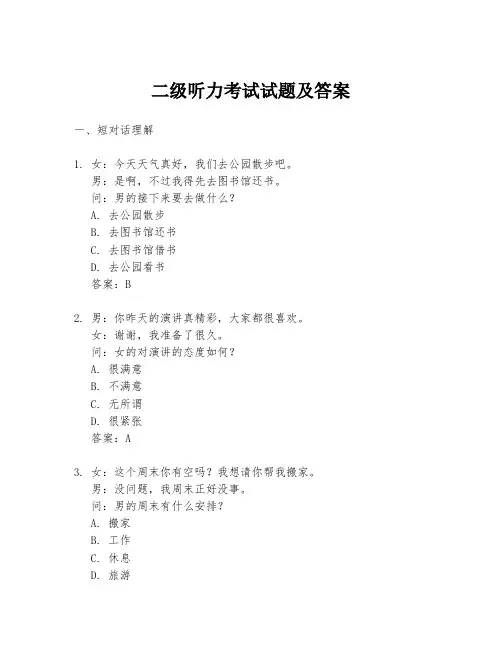
二级听力考试试题及答案一、短对话理解1. 女:今天天气真好,我们去公园散步吧。
男:是啊,不过我得先去图书馆还书。
问:男的接下来要去做什么?A. 去公园散步B. 去图书馆还书C. 去图书馆借书D. 去公园看书答案:B2. 男:你昨天的演讲真精彩,大家都很喜欢。
女:谢谢,我准备了很久。
问:女的对演讲的态度如何?A. 很满意B. 不满意C. 无所谓D. 很紧张答案:A3. 女:这个周末你有空吗?我想请你帮我搬家。
男:没问题,我周末正好没事。
问:男的周末有什么安排?A. 搬家B. 工作C. 休息D. 旅游答案:A4. 男:你昨天为什么没来上课?女:我感冒了,所以在家休息。
问:女的为什么没来上课?A. 感冒了B. 家里有事C. 不喜欢这门课D. 去看电影了答案:A5. 女:这本书你看完了吗?我想借来看看。
男:还没呢,不过你可以先拿去。
问:男的对这本书的态度如何?A. 很喜欢B. 不喜欢C. 无所谓D. 还没看完答案:D二、长对话理解听下面一段对话,回答6-10题。
男:你好,我想订一张去上海的机票。
女:好的,请问您想订哪天的?男:明天的。
女:明天的机票已经售罄了,后天的可以吗?男:后天的也行,多少钱?女:经济舱是800元,商务舱是1500元。
男:那就订经济舱吧。
女:好的,请问您的姓名和联系方式?男:我叫李明,电话是1234567890。
女:好的,李先生,您的机票已经订好了,后天早上8点的航班。
6. 男的想订哪天的机票?A. 今天B. 明天C. 后天D. 大后天答案:B7. 明天的机票还有吗?A. 有B. 没有C. 不清楚D. 只有商务舱答案:B8. 男的最后订了哪种舱位的机票?A. 经济舱B. 商务舱C. 头等舱D. 不确定答案:A9. 男的叫什么名字?A. 李明B. 张伟C. 王强D. 赵刚答案:A10. 男的订的机票是哪天的?A. 今天B. 明天C. 后天D. 大后天答案:C结束语:以上是本次二级听力考试的试题及答案,希望对各位考生有所帮助。
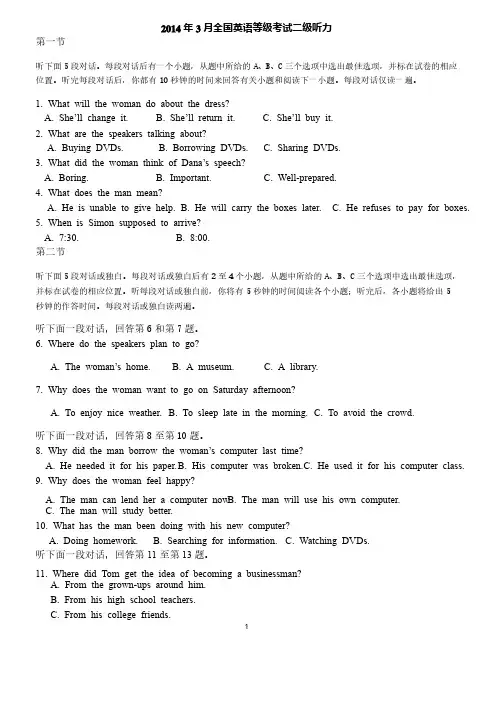
1 2014年3月全国英语等级考试二级听力第一节听下面5段对话。
每段对话后有一个小题,从题中所给的A 、B 、C 三个选项中选出最佳选项,并标在试卷的相应位置。
听完每段对话后,你都有10秒钟的时间来回答有关小题和阅读下一小题。
每段对话仅读一遍。
1. What will the woman do about the dress? A. She’ll change it. B. She’ll return it. C. She’ll buy it. 2. What are the speakers talking about? A. Buying DVDs. B. Borrowing DVDs. C. Sharing DVDs. 3. What did the woman think of Dana’s speech?A. Boring. B. Important. C. Well-prepared. 4. What does the man mean? A. He is unable to give help. A. He is unable to give help. B. He will carry the boxes later. B. He will carry the boxes later. C. He refuses to pay for boxes. 5. When is Simon supposed to arrive? A. 7:30. B. 8:00. 第二节听下面5段对话或独白。
每段对话或独白后有2至4个小题,从题中所给的A 、B 、C 三个选项中选出最佳选项,并标在试卷的相应位置。
听每段对话或独白前,你将有5秒钟的时间阅读各个小题;听完后,各小题将给出5秒钟的作答时间。
每段对话或独白读两遍。
听下面一段对话,回答第6和第7题。
6. Where do the speakers plan to go? A. The woman’s home. B. A museum. C. A library. 7. Why does the woman want to go on Saturday afternoon? A. To enjoy nice weather. B. To sleep late in the morning. B. To sleep late in the morning. C. To avoid the crowd. C. To avoid the crowd. 听下面一段对话,回答第8至第10题。
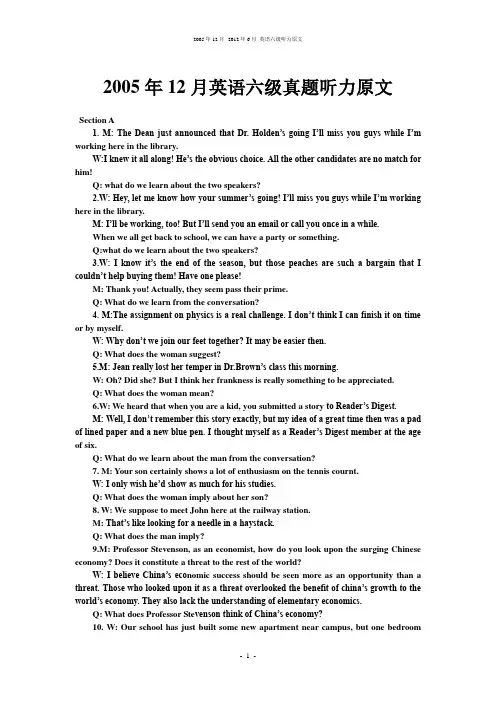
2005年12月英语六级真题听力原文Section A1. M: The Dean just announced that Dr. Holden’s going I’ll miss you guys while I’m working here in the library.W:I knew it all along! He’s the obvious choice. All the other candidates are no match for him!Q: what do we learn about the two speakers?2.W: Hey, let me know how your summer’s going! I’ll miss you guys while I’m working here in the library.M: I’ll be working, too! But I’ll send you an email or call you once in a while.When we all get back to school, we can have a party or something.Q:what do we learn about the two speakers?3.W: I know it’s the end of the season, but those peaches are such a bargain that I couldn’t help buying them! Have one please!M: Thank you! Actually, they seem pass their prime.Q: What do we learn from the conversation?4. M:The assignment on physics is a real challenge. I don’t think I can finish it on time or by myself.W: Why don’t we join our feet together? It may be easier then.Q: What does the woman suggest?5.M: Jean really lost her temper in Dr.Brown’s class this morning.W: Oh? Did she? But I think her frankness is really something to be appreciated.Q: What does the woman mean?6.W: We heard that when you are a kid, you submitted a story to Reader’s Digest.M: Well, I don’t remember this story exactly, but my idea of a great time then was a pad of lined paper and a new blue pen. I thought myself as a Reader’s Digest member at the age of six.Q: What do we learn about the man from the conversation?7. M: Your son certainly shows a lot of enthusiasm on the tennis cournt.W: I only wish he’d show as much for his studies.Q: What does the woman imply about her son?8. W: We suppose to meet John here at the railway station.M: That’s like looking for a needle in a haystack.Q: What does the man imply?9.M: Professor Stevenson, as an economist, how do you look upon the surging Chinese economy? Does it constitute a threat to the rest of the world?W: I believe China’s eco nomic success should be seen more as an opportunity than a threat. Those who looked upon it as a threat overlooked the benefit of china’s growth to the world’s economy. They also lack the understanding of elementary economics.Q: What does Professor Ste venson think of China’s economy?10. W: Our school has just built some new apartment near campus, but one bedroomruns for 500 dollars a month.M: That’s a bit beyond the reach of most students!Q: What does the man mean?Section BPassage OneI had flown from San Francisco to Virginia to attend a conference on multiculturalism. Hundreds of educators from across the country were meeting to discuss the need for greater cultural diversity in the school curriculum. I took a taxi to my hotel. On the way, my driver and I chatted about the whether and the tourists. The driver was a White man in forties. ‘How long have you been in this country?’ he asked. ‘All my life!’ I replied, ‘I was born in the United States.’ With strong southern accent, he remarked, ‘I was wondering because your English is excellent.’ Then I explained as I had done many times before, ‘My grandfather came here from China in the 1880s. My family has been here in America for ever a hundred years.’ He glanced at me in the mirror. Somehow, I didn’t look American to him. My appearance looked foreign. Questions liked the one my taxi driver asked make me feel uncomfortable. But I can understand why he could not see me as an American. He had a narrow but widely shared sense of the past: a history that has viewed Americans as descendants of Europeans. Race has functioned as something necessary to the construction of American character and quality in the creation of our national identity—American has been defined as ‘white’. But American has been racially diverse since our very beginning on the Virginia shore, where the first group of Englishmen and Africans arrived in the 17th century. And this reality is increasingly become visible everywhere.11.What was the theme of the conference the speaker was to attend?12.Why did the taxi driver ask the speaker how long he has been in the US?13.What message did the speaker wish to convey?Passage TwoLaws have been written to govern the use of American National Flag, and to ensure proper respect for the flag. Custom has also governed the common practice in regard to its use. All the armed services have precise regulations on how to display the national flag. This may vary somewhat from the general rules. The national flag should be raised and lowered by hand. Do not raise the flag while it is folded. Unfold the flag first, and then hoist it quickly to the top of the flagpole. Lower it slowly and with dignity. Place no objects on or over the flag. Do not use the flag as part of a costume or athletic uniform. Do not print it upon cushions, handkerchiefs, paper napkins or boxes. A federal law provides that the trademark cannot be registered if it comprises the flag, or badgers of the US, When the flag is used to unveil a statue or monument, it shouldn’t serve as a covering of the object to be unveiled. If it is displayed on such occasions, do not allow the flag to fall to the ground, but let it be carried high up in the air to form a feature of the ceremony. Take every precaution to prevent the flag from soiled. It should not be allowed to touch the ground or floor, nor to brush against objects.14.How do Americans ensure proper respect for the national flag?15.What is the regulation regarding the raising of the American National Flag?16. How should the American National Flag be displayed at an unveiling ceremony?17.What do we learn about the use of the American National Flag?Passage ThreeIn some large American city schools, as many as 20-40% of the students are absent each day. There are two major reasons for such absences: one is sickness, and the other is truancy. That is staying away from school without permission. Since school officials can’t do much about the illness, they are concentrating on reducing the number of truancy. One of the most promising schemes has been tried in Florida. The pupils there with good attendance have been given free hamburgers, toys and T-shirts. Classes are told if they show improved rates of attendance, they can win additional gifts. At the same time, teachers are encouraged to inspire their students to come to school regularly. When those teachers are successful, they are also rewarded. “we’ve been punishing truancy for years, but that hasn’t brought them back to school,” One school principal sa id. Now we are trying the positive approach. Not only do you learn by showing up every day, but you earn. In San Francisco, the board of education has had a somewhat similar idea. Schools that show a decrease in deliberate destruction of property can receive the amount of money that would be spent on repairs and replacements. For example, 12,000 dollars had been set aside for a school’s property damages every year. Since repair expenses of damaged property required only 4,000 dollars, the remaining 8,000 do llars was turned over to the student activity fund. “Our democracy operates on hope and encouragement,” said the school board member. “Why not provide some positive goals for students and teachers to aim at?”18 which reason for students’ absences is discussed in great detail?19 who will benefit from the scheme being tried in Florida?20 what measure has been taken in San Francisco to reduce the destruction of school property?[答案]1-10DABCA ADCAB11-20CDAAB DCCDB2006年6月英语六级真题听力原文Section A1. M: Mary, could you please tell Thomas to contact me? I was hoping he would be able to help me out with the freshmen orientation program next week.W: I would certainly tell him if I saw him, but I haven't seen him around for quite a few days.Q: What does the woman mean?2. M: Susan, I am going to change the light bulb above the dining room table. Will you hold the ladder for me?W: No problem. But be careful while you're up there.Q: What does the man want the woman to do?3. W: It's freezing cold. Let me make some coffee to warm us up. Do you want a piece of pie as well?M: Coffee sounds great. But I'm going to have dinner with some friends in a while, so I'd better skip the pie.Q: What does the man mean?4. W: How come Jim lost his job?M: I didn't say he had lost it. All I said was if he didn't get out and start selling a few cars instead of idling around all day, he might find himself looking for a new job.Q: What does the man say about Jim?5. M: Hello, Mary. This is Paul at the bank. Is Tony home?W: Not yet. Paul. I don't think you can reach him at the office now, either. He phoned me five minutes ago to say he was stopping for a hair-cut on his way home.Q: Who do you think the woman probably is?6. W: Oh! Boy! I don't understand how you got a ticket today. I always thought you were slow even driving on the less crowded fast lane.M: I'm usually careful. But this time I thought I could get through the intersection before the light turned.Q: What do we learn about the man?7. W: Your dog certainly seems to know you are his master. Did you have to punish him very often when you trained him?M: I found it's much better to praise him when he obeys and not to be so fussy when he makes mistakes.Q: What does the man say about training dogs?8. M: I am afraid there won't be time to do another tooth today. Make sure you don't eat anything like stakes for the next few hours, and we'll fill the other cavity tomorrow.W: All right. Actually, I must hurry to the library to return some books.Q: Where does the conversation most probably take place?9. W: I am worried about Jenny going to college. College students are so wild nowadays.M: Actually, only a few are like that. Most students are too busy studying to have time to cause trouble.Q: What does the man imply?10. W: You didn't seem to be terribly enthusiastic about the performance.M: You must be kidding. I couldn't have clapped any harder. My hands are still hurting.Q: What does the man think of the performance?Section BPassage 1Born and raised in central Ohio, I'm a country girl through and through. I'm currently studying to become a physical therapist, a career path that marks a great achievement for me. At Ohio State University, admission into the physical therapy program is intensely competitive. I made it pass the first cut the first year I applied, but was turned down for admission. I was crushed, because for years I have been determined to become a physical therapist. I received advice from friends and relatives about changing my major and finding another course for my life. I just couldn't do it. I knew I could not be as happy in another profession. So I stilled myself, began to work seriously for another year and reapplied. Happily I received notice of my admission. Later, I found out that less than 15% of the applicant had been offered positions that year. Now in the first two years of professional training, I couldn't be happier with my decision not to give up on my dream. My father toldme that if I wanted it badly enough, I would get in. Well, Daddy, I wanted it. So there. After graduation, I would like to travel to another country, possibly a Latin American country and work in a children's hospital for a year or two. So many of the children there are physically handicapped but most hospitals don't have the funding to hire trained staff to care for them properly. I would like to change that somehow.11. What is the speaker's field of study?12. According to the speaker, what contributed to her admission to Ohio State University?13. Why does the speaker want to go to a Latin American country?Passage 2Gabriela Mistral was once an ordinary teacher in a small village school in Northern Chile. Towering mountains separate her village from the world outside. Gabriela Mistral was only fifteen when she began teaching, but she was a good teacher. She helped the minds of her students' scale the mountain walls and reached out to the world beyond. For eighteen years, Gabriela devoted her life to the poor farm children of Chile's Northern valleys. During part of this time, she was director of schools in all of Chile. Before long, many countries recognized her as a great friend of children and the leader in education. In 1922, she was invited to Mexico to help organize the rural school system. Two years later, Gabriela Mistral came to the United States where she served as a visiting professor in several colleges. In New York City, a group of teachers helped to finance the publication of her first book of poetry. Some of her books have been translated into six different languages. She gave the income from some of her books to help poor and neglected children. Beginning in the 1920's, her interests reached out to broader fields. Statesmen asked her advice on international problems. She tried to break through the national barriers that hindered the exchange of ideas among the Spanish speaking peoples of South America. She tried to develop a better understanding between the United States and countries of Latin America. In 1945, she gained worldwide recognition by winning the Nobel Prize in literature, the first Southern American to win the prize.14. Where did Gabriela Mistral start her teaching career?15. How did Gabriela Mistral help the poor children of her hometown?16. Why did many countries think highly of Gabriela Mistral?17. How did Gabriela Mistral become famous all over the world?Passage 3Over time animals have developed many ways to stay away from predators. A predator is an animal that hunts and eats other animals. Hiding is one of the best ways to stay alive. Some animals hide by looking like the places where they live. To see how this works, let's look at the sea dragon. It is a master of disguise. The sea dragon is covered with skin that looks like leaves. The skin helps the dragon look like a piece of seaweed. A hungry meat eater would stay away from anything that looks like seaweed. Other animals stay safe by showing their colors. They want other animals to see them. Scientists call these bright colors--warning colors. You have probably seen animals that have warning colors. Some grasshoppers show off their own bright colors. Those colors don't just look attractive; they tell their enemies to stay away. Of course, hungry predators sometimes ignore the warning. They still go after the grasshopper. If that happens, the grasshopper has a backup defense. Itmakes lots of foam. The foam tastes so bad that the predator won't do it again. Color doesn't offer enough protection for some other animals. They have different defenses that help them survive in the wild. Many fish live in groups or schools. That's because there is safety in numbers. At the first sign of trouble, schooling fish swim as close together as they can get. Then the school of fish makes lots of twists and turns. All that movement makes it hard for predators to see individuals in a large group.18. What is the speaker mainly talking about?19. What protects the sea dragon from the meat eater's attack?20. According to the passage, why do many fish stay in groups?2006年12月英语六级真题听力原文1.W: Do you know why Mary has such a long face today?M: I don’t have the foggiest idea! She should be happy especially since she got a promotion yesterday.Q: What did the speakers mean?2.M: Hi, Johanna! Are you interested in going to an Art Exhibition on Sunday? A friend of mine is showing some of her paintings there. It’s the opening night. Free drinks and food!W: Well, actually, I don’t have anything planned. It sounds kind of fun!Q: What did the man invite the woman to do on Sunday?3.M: You did an excellent job in school! You were indeed a great student! Where did your drive come from?W: Academic achievements were important to my parents as immigrants. Education is where it all begins. My mother in particular tries to get me interested in school.Q: what do we learn about the woman from the conversation?4.M: I hear the Sunflower Health Club on Third Street is good!W: Not right now! I used to go there. I thought it was great because it was real cheap. But the problem was it was always crowded. Sometimes, I had to wait to use the machines.Q: What does the woman say about the Sunflower health club?5.W: Tom is very excited! Just yesterday he received his doctoral degree and in a few minutes he’ll be putting the ring on Sarah‘s finger.M: He’s really such a luck dog! Sarah is a lovely bride and toni ght they are going to Hawaii on their honeymoon!Q: What do we learn from the conversation?6.W: Your chemistry examination is over, isn’t it? Why do you still look so worried?M: I don’t know. It wasn’t that the questions were too hard, or they were too many of them. But I’m still feeling uneasy because the exam didn’t seem to have much to do with the course material.Q: What does the man mean?7.W: Your wife told me that you eat out four or five times a week, I really envy you!M: Don’t envy me! It’s for business. In fact, I’m sick and tired of restaurant food! Sometimes, I just prefer a home-cooked meal.Q: Why does the man say he often eats out?8.W: I was amazed when I heard Tony played piano so expertly! From the way he talked, I thought he was just starting his lessons.M: Oh, no! That’s the way he always talks!Q: What can we infer about Tony from the conversation?9.M: What do you think of people suing McDonalds for making them fat?W: Well. Its food doesn’t make you fat. But eating too much of it does! How about chocolate and ice cream? Are they all responsible? It’s silly!Q: What does the woman think of the lawsuit against McDonalds?10.M: I’m terribly sorry ma’am, but your flight has been cancelled. I won’t be able to put you on another one until tomorrow morning.W: Well, I certainly hope the airline’s going to put me up somewhere tonight.Q: What did the woman request the airline do?Passage oneYou have probably heard of the DuPont company, which was founded by a family of the same name. But do you know about the museum that one of the family members began? Henry Francis Du Pont was an heir to Delaware’s DuPont Company fortune. He was one of the first serious collectors of American decorative art objects: furniture, textiles, paintings and other objects made in United States between 1640 and 1840. American furniture and household objects had been considered inferior to those from Europe. But Du Pont helped develope a new appreciation for American decorative arts. He created a legendary show plays for these objects on his family estate just outside Wilmington, Delaware. In 1951, it was open to the public as the Henry Francis Du Pont Winterthur Museum. The museum assembled objects from Du Pont’s collection into 175 period rooms, each with examples of American antiques and decorative arts that followed a certain theme of period in early American history. For example, the Du Pont dining room has furniture dating from the late 18th and early 19th centuries. And because this was the time when the United States became a new nation, there’s a patriotic theme in the room. Another example is the Chinese parlor, which has furnishings that would reflect American’s fascination with Asian culture during the 18th century. In these period rooms, Du Pont believed he could tell the story of the early United States through furniture and other decorative arts.11. What is Henry Francis Du Pont noted for?12. What was the purpose of Du Pont’s efforts?13. How were the objects on display arranged?Passage twoAccording to David Grattle, a British language expert, the idea that English will become the world language is outdated. And people are more likely to switch between two or more languages for routine communication in the future. The share of the world’s population that speaks English as a native language is falling. Instead, English will play a growing role as a second language. A population speaking more than one language is already the case in much of the world and is becoming more common in the United States. Indeed, the census bureau reported last year that nearly one American in five speaks a language other than English at home, with Spanish taking the lead, followed by Chinese. Grattle works for British consulting and publishing business. He anticipates a world with the share of people who are native English speakers slips from 9% in the mid 1990s to 5% in 2050. Grattle says, “Upuntil 1995, English was the second most common native tongue in the world, trailing only Chinese. By 2050, Chinese will continue its predominance with Hindi Woodoo of India and Arabic climbing past English and Spanish nea rly equal to it.” In contrast, an American language expert, David Harrison noted that the global share of English is much larger if you count second language speakers, and will continue to rise even as the proportion of native speakers declines. Harrison disputed listing Arabic in top three languages because varieties of Arabic spoken in such countries as Egypt and Morocco are mutually incomprehensible.14. What does David Grattle say about the use of languages for daily communication in the future?15. Why doesn’t David Harrison include Arabic as one of the top three languages?16. What can we infer from the passage?Passage threeThere are about 1 million blind people in the United States. The largest and most influential organization of blind people in this country is the National Federation of the Blind. Its officials say the nation doesn’t have any colleges or universities that serve only blind students. They say the reason for this is that blind people must learn to live among people who can see. American colleges and universities do accept blind and visually impaired students, and they provide services to help these students succeed. For example, colleges find people who write down what the professor say in class and they provide technology that can help blind students with their work. However, experts say colleges can best help blind students by making it clear that the students should learn to help themselves. One blind American student named T recently made news because he graduated from medical school from the University of Wisconsin. He said technology was one of the reasons he succeeded. He used a computer that read into his earphone what he was typing. He also used a small printer that permitted him to write notes about his patients in the hospital. He did his undergraduate work at the University of Notre Dame in South Bend, Indiana. National Federation of the Blind officials say blind students from other nations do come to the United States to attend college. Some can even get financial aid. The Federation awards about 30 scholarships each year that have no citizenship requirement.17. According to officials of the National Federation of the Blind, why are there no special colleges for blind students only?18. According to experts how can colleges best help blind students?19. What is one of the reasons given by T as a blind student for his success?20. What can blind students from overseas do to study in America according to the National Federation of the Blind?2007年6月英语六级真题听力原文11、W: Jim, you are on the net again! We are going to get off. It s time for the talk show! M: Just a minute dear! I m looking at a new jewelry site. I want to make sure I get the right gift for mom s birthday.Q: What is the man doing right now?12.W: I ve never seen you have such confidence before in the exam!M: It s more than confidence! Right now I felt that if I got less than an A, it will be the fault of the exam itself.Q: What does the man mean?13.W: Just look at this newspaper! Nothing but murder, death and war! Do you still believe people are basically good?M: Of course I do! But newspapers hardly ever report stories about peace and generosity. They are not news!Q: What do we learn from the conversation?14.M: Tom must be joking when he said he plans to sell his shop and go to medical school. W: You are quite right! He s just kidding! He s also told me time and time again he wished to study for some profession instead of going into business.Q: What will Tom probably do according to the conversation?15.W: I hear your boss has a real good impression of you, and he is thinking about giving you two more days off each month.M: I hope not. I d rather get more work hours I can get enough bucks to help out my two kids at college.Q: What does the man truly want?16.M: I heard you took a trip to Mexico last month. How did you like it?W: Oh, I got sick and tired of the hotel and hotel food! So now I understand the thing: East, west, home s best!Q: What does the woman mean?17.W: I m worried about Anna. She s really been depressed lately. All she does is staying in her room all day.M: That sounds serious! She d better see a psychiatrist at the counseling centre.Q: What does the man suggest Anna do?18.M: I could hardly recognize Sam after we got that new job! He s always in a suit and tie now.W: Yeah. He was never liked that in college. Back then, he went around in old T-shirts and jeans.Q: What does the speaker say about Sam?Conversation 1M: Hi, Anna! Welcome back! How’s your trip to the States?W: Very busy. I had a lot of meetings, so, of course, I didn’t have much time to see New York. M: What a pity! Actually, I have a trip there myself next week.W: Do you? Then take my advice, do the well-being in the air program. It really works.M: Oh, I read about that in a magazine. You say it works?W: Yes, I did the program on the flight to the States, and when I arrived at New York, I didn’t have any problem, no jet lag at all. On the way back, I didn’t do it, and I felt terrible. M: You’re joking!W: Not at all, it really meant a lot of difference.M: En. So what did you do?W: Well, I didn’t drink an alcohol or coffee, and I didn’t eat any meat or rich food. I drink a lot of water, and fresh juice, and I ate the noodles on the well-being menu. They’re lighter. They have fish, vegetables, and noodles, for example, and I did some of the exercises of theprogram.M: Exercises? On a plane?W: Yes. I didn’t do many, of course, there isn’t much space on a plane.M: How many passengers do the exercises?W: Not many.M: Then how much champagne did they drink?W: A lot! It was more popular than mineral water.M: So, basically, it’s a choice. Mineral water and exercises, or champagne and jet lag.W: That’s right! It’s a difficult choice.Questions 19 to 22 are based on the conversation you’ve just heard.19. Why did the woman go to New York?20. What does the woman say about the well-being in the air program?21. What did the woman do to follow the well-being menu?22. What did the woman say about other passengers?Conversation Two:W: Morning. Can I help you?M: Well, I’m not rally sure. I’m just looking.W: I see. Well, there’s plenty to look at it again this year. I’m sure you have to walk miles to see each stand.M: That’s true.W: Er…, would you like a coffee? Come and sit down for a minute, no obligation.M: Well, that’s very kind of you, but…W: Now, please. Is this the first year you’ve been to the fair, Mr….M: Yes, Johnson, James Johnson.W: My name’s Susan Carter. Are you looking for anything in particular, or are you interested in computers in general?M: Well, actually, I have some specific jobs in mind. I owe a small company, we’ve grown quite dramatically over the past 12 months, and we really need some technological help to enable us to keep on top of everything.W: What’s your line of business, Mr. Johnson?M: We’re a training consultancy.W: I see. And what do you mean “to keep on top”?M: The first thing is correspondence. We have a lot of standard letters and forms. So I suppose we need some kind of word processor.W: Right. Well, that’s no problem. But it ma y be possible for you to get a system that does a lot of other things in addition to word processing. What might suit you is the MR5000. That’s it over there! It’s IBM compatible.M: What about the price?W: Well, the MR5000 costs 1,050 pounds. Software comes free with the hardware.M: Well, I’ll think about it. Thank you.W: Here’s my card. Please feel free to contact me.Questions 23 to 25 are based on the conversation you’ve just heard:23. Where did the conversation take place?24. What are the speakers talking about?。
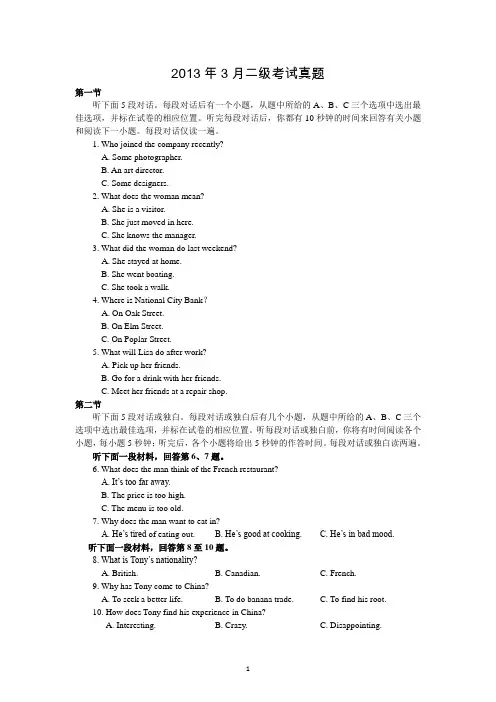
2013年3月二级考试真题第一节听下面5段对话。
每段对话后有一个小题,从题中所给的A、B、C三个选项中选出最佳选项,并标在试卷的相应位置。
听完每段对话后,你都有10秒钟的时间来回答有关小题和阅读下一小题。
每段对话仅读一遍。
1. Who joined the company recently?A. Some photographer.B. An art director.C. Some designers.2. What does the woman mean?A. She is a visitor.B. She just moved in here.C. She knows the manager.3. What did the woman do last weekend?A. She stayed at home.B. She went boating.C. She took a walk.4. Where is National City Bank?A. On Oak Street.B. On Elm Street.C. On Poplar Street.5. What will Lisa do after work?A. Pick up her friends.B. Go for a drink with her friends.C. Meet her friends at a repair shop.第二节听下面5段对话或独白。
每段对话或独白后有几个小题,从题中所给的A、B、C三个选项中选出最佳选项,并标在试卷的相应位置。
听每段对话或独白前,你将有时间阅读各个小题,每小题5秒钟;听完后,各个小题将给出5秒钟的作答时间。
每段对话或独白读两遍。
听下面一段材料,回答第6、7题。
6. What does the man think of the French restaurant?A. It’s too far away.B. The price is too high.C. The menu is too old.7. Why does the man want to eat in?A. He’s tired of eating out.B. He’s good at cooking.C. He’s in bad mood.听下面一段材料,回答第8至10题。
2020年9月PETS2英语听力考试真题及录音文本MP3免费下载链接:https:///s/1ukA5JkmYZb3IYxW6mPg4KA提取码:uolt复制这段内容后打开百度网盘手机App,操作更方便。
第一节听下面5段对话。
每段对话后有一个小题,从题中所给的A、B、C三个选项中选出最佳选项,并标在试卷的相应位置。
1. Why does Jane become thinner?A. She has been on a diet.B. She has had an illness.C. She has exercised a lot.2. Where are the speakers?A. In a library.B. In a bookshop.C. In a classroom.3. What time does the bus usually arrive?A. 7:30.B. 7:35.C. 7:40.4. What is the probable relationship between the speakers?A. Mother and son.B. Husband and wife.C. Teacher and student.5. What are the speakers talking about?A. Kate’s friends.B. Today’s weather.C. Jim’s weekend.第二节听下面5段对话或独白。
每段对话或独白后有2至4个小题,从题中所给的A、B、C三个选项中选出最佳选项,并标在试卷的相应位置。
听下面一段对话,回答第6和第7题。
6. What does the woman do?A. She’s a doctor.B. She’s a waitress.C. She’s a teacher.7. What is the man going to do?A. Give up his unhealthy diet.B. Have a further examination.C. Go on sick leave from work.听下面一段对话,回答第8至第10题。
公共英语pets二级听力真题2017年公共英语pets二级听力真题困难并不可怕,可怕的是没有战胜困难的`勇气。
以下是店铺为大家搜索整理的2017年公共英语pets二级听力真题,希望能给大家带来帮助!更多经常内容请及时关注我们店铺!text 1M:What about coming to my place for a coffee,Mary?W:I can't,John.I've got a meeting at ten o'clock,so I have to go my office now.Another time,maybe.Text 2W:The dress I'm trying on is too small.Do you have a larger size?M:Yes,but not in that color.We have a larger one in red.W:Red?Red would be lovely.M:Here you are.Text 3M:Linda could you hold this ladder?I need to get onto the roof.W:Sure.Why are you doing that?M:I want to clear the leaves off the roof.Text 3M:Linda,could you hold this ladder?I need to get onto the roof.W:Sure.Why are you doing that?M:I want to clear the leaves off the roof.Text 4M:Are you going to the exhitbigiong in Sydney next week.Ellen?W:Well,I was planning to.but I haven't been able to reserve ahotel room.M:Have you tried the Hillsboro Hotel?They might still have space.And it's not too far farm the exhibitiong hall.Text 5W:Why on earth are we inside on such a beautiful day?M:Well it was you who wanted to spend the day at a museun.W:Shall we leave now and take a walk outside in the city square?2017年3月全国英语等级考试二级真题听力(参考答案)1.What is the woman going to go?[A]Have a coffee.[B]Clean her officie.[C]Attend a meting.2、 What does the woman ask for?[A]A dress of different size.[B]A dress of better quality.[C]A dress of a bright color.3、 What does the man want to do?[A]Borrow a ladder.[B]Take his leave.[C]Clean the roof.4、What will the woman probably do next?[A]Go to the man's place.[B]Call the Hillsboro Hotal.[C]Reaerve an exhibitiong hall5、Where are the speakers?[A]At home[B]In a museum[C]In the city square听下面一段对话,回答第6和第7题。
2022年3月19日全国英语等级考试第二级听力试题、原文和答案第一节(共5小题;每小题1.5分,满分7.5分)听下面5段对话。
每段对话后有一个小题,从题中所给的A、B、C三个选项中选出最佳选项,并标在试卷的相应位置。
听完每段对话后,你都有10秒钟的时间来回答有关小题和阅读下一小题。
每段对话仅读一遍。
1. What will the speakers probably do next?A. Tour Boston.B. Visit Caroline.C. Watch the news.2. What is J im’s suggestion about?A. Raising money.B. Hiring a lawyer.C. Calling a meeting.3. What is the woman going to do this weekend?A. Finish a report.B. Look after Bob.C. Climb a mountain.4. What does the man suggest the woman do?A. Find a full-time job.B. Study another subject.C. Go to evening classes.5. What is the man now?A. An online shop owner.B. A construction worker.C. A computer engineer.第二节(共15小题;每小题1.5分,满分22.5分)听下面5段对话或独白。
每段对话或独白后有2至4个小题,从题中所给的A、B、C 三个选项中选出最佳选项,并标在试卷的相应位置。
听每段对话或独白前,你将有5秒钟的时间阅读各个小题;听完后,各小题将给出5秒钟的作答时间。
每段对话或独白读两遍。
听第6段材料,回答第6、7题。
6. What does Miyako want to do?A. Make a call.B. Send a card.C. Hold a party.7. What is the man doing?A. Making an apology.B. Giving an explanation.C. Sharing an experience.听第7段材料,回答第8至10题。
2007年03月~2013年09月高级口译英译汉翻译真题及答案一、2007年03月翻译一(英译汉):Well before his death, Peter Drucker had already become a legend. Over his 95 prolific years, he had been a true Renaissance man, and teacher of religion, philosophy and political science. But his most important contribution, clearly, is in business. What John Keynes is to economics, Druckers is to management.In the 1980s Peter Druckers began to have grave doubts about business and even capitalism itself. He no longer saw the corporation as the ideal space to create community. In fact, he saw nearly the opposite: a place where self-interest had triumphed over the egalitarian principles he long championed. In both his writings and speeches, Druckers emerged as one of Corporate America's most important critics. When conglomerates were the rage, he preached against reckless mergers and acquisitions. When executives were engaged in empire-building, he argued against excess staff and the inefficiencies of numerous "assistants to".In a 1984 essay he persuasively argued that CEO pay had rocketed out of control and implored boards to hold CEO compensation to no more than 20 times what the rank and file made. He maintained that multi-million-dollar severance packages had perverted management's ability to look out anything but itself. What particularly enraged him was the tendency of corporate managers to reap massive earnings while firing thousands of their workers. "This is morally and socially unforgivable," wrote Druckers, "and we will pay a heavy price for it."英译汉答案:彼得•德鲁克在世时就已成为传奇人物。
2007年03月--2013年09月PETS 2级听力原文及答案
practiced and insincere.Finally comes “The Robot”—a small,thin smile lacking in warmth.The group also warns
against smiling too quickly,saying it can make you look false.The best smile,they say,is slower…and flows
naturally across the whole face.
KEYS TO THE LISTENING TESTS (200703-201309)